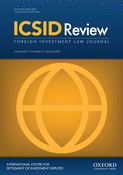-
Views
-
Cite
Cite
Rudolf Dolzer, ConocoPhillips v Venezuela and Gold Reserve v Venezuela: Expropriation: A New Focus on Old Issues , ICSID Review - Foreign Investment Law Journal, Volume 30, Issue 2, Spring 2015, Pages 378–383, https://doi.org/10.1093/icsidreview/siv010
Close - Share Icon Share
Extract
Rules on expropriation have long formed the core of the field of international investment law, but have not been in the centre of arbitral practice and scholarly debate in the past decade. Several developments may explain this loss of prominence. First, cases of outright expropriations have become rare after the 1990s, in a climate with an international focus on the beneficial effects of foreign investment. High-profile nationalizations in Latin America are an exception to this overall trend. Second, counsel and tribunals have tended to focus less on rules of expropriation and more on the scope of rules on fair and equitable treatment (FET) in cases of host State interference with foreign investment below the threshold of a formal taking. Third, the emphasis in arbitral practice on continued control on the part of the investor as a dividing line between compensable takings and non-compensable regulatory measures has contributed to reduce the practical significance of rules on indirect expropriation. When faced with the option to decide a case under rules on FET or norms on indirect expropriation, tribunals have been more inclined to turn to the former, albeit for reasons that are not always clearly articulated.




